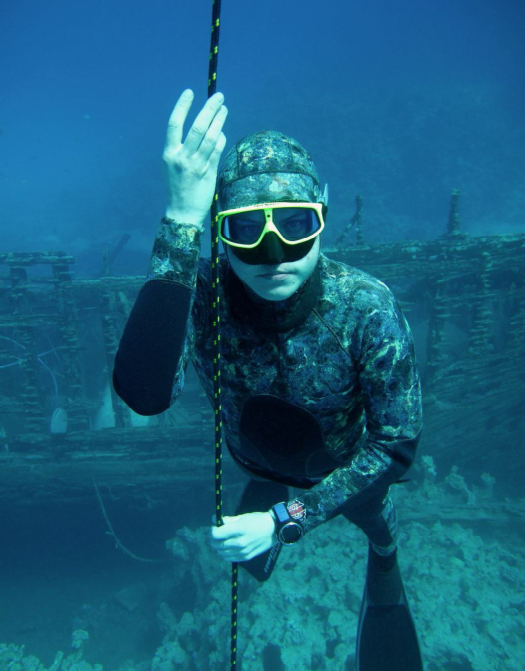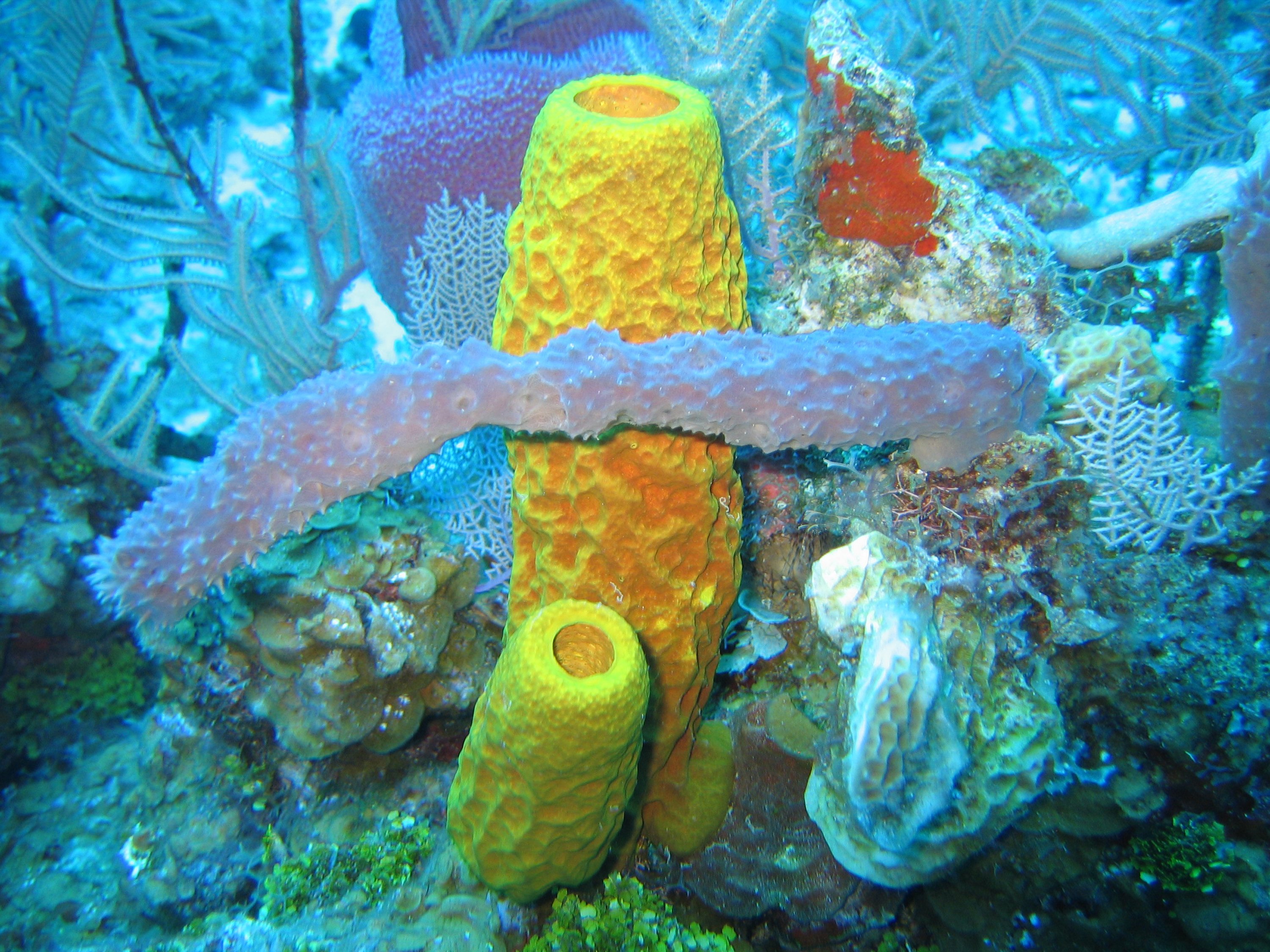|
Freediver
Freediving, free-diving, free diving, breath-hold diving, or skin diving is a form of underwater diving that relies on breath-holding until resurfacing rather than the use of breathing apparatus such as scuba gear. Besides the limits of breath-hold, immersion in water and exposure to high ambient pressure also have physiological effects that limit the depths and duration possible in freediving. Examples of freediving activities are traditional fishing techniques, competitive and non-competitive freediving, competitive and non-competitive spearfishing and freediving photography, synchronised swimming, underwater football, underwater rugby, underwater hockey, underwater target shooting and snorkeling. There are also a range of "competitive apnea" disciplines; in which competitors attempt to attain great depths, times, or distances on a single breath. Historically, the term ''free diving'' was also used to refer to scuba diving, due to the freedom of movement compared with s ... [...More Info...] [...Related Items...] OR: [Wikipedia] [Google] [Baidu] |
Freediving Blackout
Freediving blackout, breath-hold blackout or apnea blackout is a class of hypoxic blackout, a loss of consciousness caused by cerebral hypoxia towards the end of a breath-hold (freedive or dynamic apnea) dive, when the swimmer does not necessarily experience an urgent need to breathe and has no other obvious medical condition that might have caused it. It can be provoked by hyperventilating just before a dive, or as a consequence of the pressure reduction on ascent, or a combination of these. Victims are often established practitioners of breath-hold diving, are fit, strong swimmers and have not experienced problems before. Blackout may also be referred to as a syncope or fainting. Divers and swimmers who black out or grey out underwater during a dive will usually drown unless rescued and resuscitated within a short time. Freediving blackout has a high fatality rate, and mostly involves males younger than 40 years, but is generally avoidable. Risk cannot be quantified, but is cl ... [...More Info...] [...Related Items...] OR: [Wikipedia] [Google] [Baidu] |
Apnea
Apnea, BrE: apnoea, is the temporal cessation of breathing. During apnea, there is no movement of the muscles of inhalation, and the volume of the lungs initially remains unchanged. Depending on how blocked the airways are ( patency), there may or may not be a flow of gas between the lungs and the environment, but if there's sufficient flow, gas exchange within the lungs and cellular respiration wouldn't be severely affected. Voluntarily doing this is called holding one's breath. Apnea may first be diagnosed in childhood, and it is recommended to consult an ENT specialist, allergist or sleep physician to discuss symptoms when noticed; malformation and/or malfunctioning of the upper airways may be observed by an orthodontist. Cause Apnea can be involuntary—for example, drug-induced (such as by opiate toxicity), mechanically / physiologically induced (for example, by strangulation or choking), or a consequence of neurological disease or trauma. During sleep, people with sev ... [...More Info...] [...Related Items...] OR: [Wikipedia] [Google] [Baidu] |
Underwater Diving
Underwater diving, as a human activity, is the practice of descending below the water's surface to interact with the environment. It is also often referred to as diving, an ambiguous term with several possible meanings, depending on context. Immersion in water and exposure to high ambient pressure have physiological effects that limit the depths and duration possible in ambient pressure diving. Humans are not physiologically and anatomically well-adapted to the environmental conditions of diving, and various equipment has been developed to extend the depth and duration of human dives, and allow different types of work to be done. In ambient pressure diving, the diver is directly exposed to the pressure of the surrounding water. The ambient pressure diver may dive on breath-hold (freediving) or use breathing apparatus for scuba diving or surface-supplied diving, and the saturation diving technique reduces the risk of decompression sickness (DCS) after long-duration deep dives ... [...More Info...] [...Related Items...] OR: [Wikipedia] [Google] [Baidu] |
Spearfishing
Spearfishing is a method of fishing that involves impaling the fish with a straight pointed object such as a spear, gig or harpoon. It has been deployed in artisanal fishing throughout the world for millennia. Early civilisations were familiar with the custom of spearing fish from rivers and streams using sharpened sticks. Modern spearfishing usually involves the use of underwater swimming gear and slingshot-like elastic powered spearguns or compressed gas powered pneumatic spearguns, which launch a tethered underwater projectile to strike the target fish. Specialised techniques and equipment have been developed for various types of aquatic environments and target fish. Spearfishing may be done using free-diving, snorkelling or scuba diving techniques, but spearfishing while using scuba equipment is illegal in some countries. The use of mechanically powered spearguns is also outlawed in some countries and jurisdictions such as New Zealand. Spearfishing uses no bait and is ... [...More Info...] [...Related Items...] OR: [Wikipedia] [Google] [Baidu] |
Snorkeling
Snorkeling ( British and Commonwealth English spelling: snorkelling) is the practice of swimming on or through a body of water while equipped with a diving mask, a shaped breathing tube called a snorkel, and usually swimfins. In cooler waters, a wetsuit may also be worn. Use of this equipment allows the snorkeler to observe underwater attractions for extended periods with relatively little effort and to breathe while face-down at the surface. Snorkeling is a popular recreational activity, particularly at tropical resort locations. It provides the opportunity to observe underwater life in a natural setting without the complicated equipment and training required for scuba diving. It appeals to all ages because of how little effort is involved and is the basis of the two surface disciplines of the underwater sport of finswimming. Snorkeling is also used by scuba divers when on the surface, in underwater sports such as underwater hockey and underwater rugby, and as part of water-b ... [...More Info...] [...Related Items...] OR: [Wikipedia] [Google] [Baidu] |
Military Campaign
A military campaign is large-scale long-duration significant military strategy plan incorporating a series of interrelated military operations or battles forming a distinct part of a larger conflict often called a war. The term derives from the plain of Campania, a place of annual wartime operations by the armies of the Roman Republic. Definition 1. A military campaign denotes the time during which a given military force conducts combat operations in a given area (often referred to as AO, area of operation). A military campaign may be executed by either a single Armed Service, or as a combined services campaign conducted by land, naval, air, cyber and space forces. 2. The purpose of a military campaign is to achieve a particular desired resolution of a military conflict as its strategic goal. This is constrained by resources, geography and/or season. A campaign is measured relative to the technology used by the belligerents to achieve goals, and while in the pre-industrial E ... [...More Info...] [...Related Items...] OR: [Wikipedia] [Google] [Baidu] |
Sponge
Sponges, the members of the phylum Porifera (; meaning 'pore bearer'), are a basal animal clade as a sister of the diploblasts. They are multicellular organisms that have bodies full of pores and channels allowing water to circulate through them, consisting of jelly-like mesohyl sandwiched between two thin layers of cells. Sponges have unspecialized cells that can transform into other types and that often migrate between the main cell layers and the mesohyl in the process. Sponges do not have nervous, digestive or circulatory systems. Instead, most rely on maintaining a constant water flow through their bodies to obtain food and oxygen and to remove wastes. Sponges were first to branch off the evolutionary tree from the last common ancestor of all animals, making them the sister group of all other animals. Etymology The term ''sponge'' derives from the Ancient Greek word ( 'sponge'). Overview Sponges are similar to other animals in that they are multicellular, he ... [...More Info...] [...Related Items...] OR: [Wikipedia] [Google] [Baidu] |
Pearl
A pearl is a hard, glistening object produced within the soft tissue (specifically the mantle) of a living shelled mollusk or another animal, such as fossil conulariids. Just like the shell of a mollusk, a pearl is composed of calcium carbonate (mainly aragonite or a mixture of aragonite and calcite) in minute crystalline form, which has deposited in concentric layers. The ideal pearl is perfectly round and smooth, but many other shapes, known as baroque pearls, can occur. The finest quality of natural pearls have been highly valued as gemstones and objects of beauty for many centuries. Because of this, ''pearl'' has become a metaphor for something rare, fine, admirable and valuable. The most valuable pearls occur spontaneously in the wild, but are extremely rare. These wild pearls are referred to as ''natural'' pearls. ''Cultured'' or ''farmed'' pearls from pearl oysters and freshwater mussels make up the majority of those currently sold. Imitation pearls are also widely s ... [...More Info...] [...Related Items...] OR: [Wikipedia] [Google] [Baidu] |
Marine Salvage
Marine salvage is the process of recovering a ship and its cargo after a shipwreck or other maritime casualty. Salvage may encompass towing, re-floating a vessel, or effecting repairs to a ship. Today, protecting the coastal environment from spillage of oil or other contaminants is a high priority. Before the invention of radio, salvage services would be given to a stricken vessel by any ship that happened to be passing by. Nowadays, most salvage is carried out by specialist salvage firms with dedicated crew and equipment. The legal significance of salvage is that a successful salvor is entitled to a reward, which is a proportion of the total value of the ship and its cargo. The amount of the award is determined subsequently at a "hearing on the merits" by a maritime court in accordance with Articles 13 and 14 of the International Salvage Convention of 1989. The common law concept of salvage was established by the English Admiralty Court, and is defined as "a voluntary succe ... [...More Info...] [...Related Items...] OR: [Wikipedia] [Google] [Baidu] |
Agata Bogusz Wrakowe
Agata may refer to: * AGATA (organization), a Lithuanian non-profit performing rights organization Name * Agatha (given name), Agata (given name) * Agata (surname) Places *Agata Station, a train station in Ashikaga, Tochigi Prefecture, Japan Physics * AGATA (gamma-ray detector), Advance GAmma Tracking Array Miscellaneous * Agata (dog), a Colombian drug-detection dog * 7366 Agata, a main belt asteroid discovered in 1996 * Agata potato, a potato variety * Histria Agata, a floating storage and offloading unit {{disambiguation ... [...More Info...] [...Related Items...] OR: [Wikipedia] [Google] [Baidu] |
Plato
Plato ( ; grc-gre, Πλάτων ; 428/427 or 424/423 – 348/347 BC) was a Greek philosopher born in Athens during the Classical period in Ancient Greece. He founded the Platonist school of thought and the Academy, the first institution of higher learning on the European continent. Along with his teacher, Socrates, and his student, Aristotle, Plato is a central figure in the history of Ancient Greek philosophy and the Western and Middle Eastern philosophies descended from it. He has also shaped religion and spirituality. The so-called neoplatonism of his interpreter Plotinus greatly influenced both Christianity (through Church Fathers such as Augustine) and Islamic philosophy (through e.g. Al-Farabi). In modern times, Friedrich Nietzsche diagnosed Western culture as growing in the shadow of Plato (famously calling Christianity "Platonism for the masses"), while Alfred North Whitehead famously said: "the safest general characterization of the European philosophical tra ... [...More Info...] [...Related Items...] OR: [Wikipedia] [Google] [Baidu] |
Fishing
Fishing is the activity of trying to catch fish. Fish are often caught as wildlife from the natural environment, but may also be caught from stocked bodies of water such as ponds, canals, park wetlands and reservoirs. Fishing techniques include hand-gathering, spearing, netting, angling, shooting and trapping, as well as more destructive and often illegal techniques such as electrocution, blasting and poisoning. The term fishing broadly includes catching aquatic animals other than fish, such as crustaceans ( shrimp/ lobsters/crabs), shellfish, cephalopods (octopus/squid) and echinoderms ( starfish/ sea urchins). The term is not normally applied to harvesting fish raised in controlled cultivations ( fish farming). Nor is it normally applied to hunting aquatic mammals, where terms like whaling and sealing are used instead. Fishing has been an important part of human culture since hunter-gatherer times, and is one of the few food production activities that have persisted ... [...More Info...] [...Related Items...] OR: [Wikipedia] [Google] [Baidu] |






.jpg)

